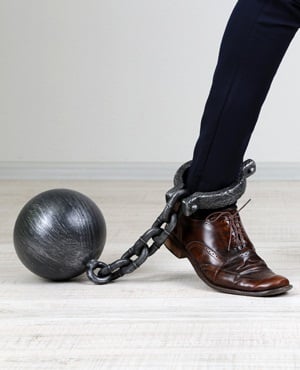
Johannesburg - It is normally not just one thing that causes a person to get into a position where they can’t pay bills any more, explains Rita Cool, Certified Financial Planner® and financial consultant at Alexander Forbes Financial Services.
"There are only two ways to get out of a spiral like this: Earn more or spend less," she said.
"Both are easier said than done and sometimes both are out of your control."
She offers these tips to help consumers get back into financial fitness:
- Look at your budget. Really look. I find that most often people don’t have budgets and they don’t know where the money is going to.
Then it is impossible to know how to get out of a bad financial situation;
- Understand that, like most good things in life, you will not get out of the situation quickly. Don’t give up as it is possible to get out of it;
- You must set up a plan to get out of your difficulties. It is not going to go away by itself;
- Address the problem earlier rather than later. The same as a cancer that can be treated if you catch it early, don’t wait until the bills are piled up high on the table and you are avoiding all telephone calls as they might be asking for money;
- Look at who is charging you what. Which account must be paid first before you lose a house? Which account has the highest interest? Pay that first when you set up the payment plan;
- Approach the people or places where you owe money if you realise you are in trouble.
If the payment difficulty is due to a short term issue like maternity leave or retrenchment, it might be very easy to halt premiums or arrange easier terms for that period without it becoming an issue.
If it is a longer term problem, see if it can’t be negotiated before it becomes a problem.
- Know your rights. Get legal advice if it appears you are about to lose your house and the situation doesn’t look right.
There are places that can help you for free.
- If you are not comfortable with dealing with companies or lawyers or do not understand the terminology or what is happening, ask.
Ask a friend you trust and who might understand the situation to help you or ask the institution to explain it until you understand what is happening;
- Check your statements and query excessive charges set by lawyers or debt collecting agencies.
Very often the costs and interest run much higher than the amount owed and you are paying for each SMS follow up and piece of paper used;
- If you are really stuck, approach a debt counsellor to help you negotiate your debt repayments;
- Be cautious of debt consolidation. It might look easier to only pay one place and one interest rate, but you might be paying interest over a longer period and it works out to be more expensive;
- Try to break bad financial habits like withdrawing cash from an ATM that doesn’t belong to your bank. This will save you service fees.
- Look at how much your banking fees are and if you can save on insurance or services;
- Try not to borrow from Peter to pay Paul. So don’t borrow more to repay an existing debt. It is going to put you into a debt spiral;
- When the going is good try to build up a reserve for emergencies like being retrenched or getting sick or a car breaking down.
The rule of thumb is to have the equivalent of three to six months’ salary, but check your monthly budget;
- If you are in trouble, see if it is possible to cancel or stop non-essentials like pay TV or entertainment costs as a first step.
Try not to cancel insurance cover or medical aid. This might just be the period that something happens to your car or you and you go even deeper into debt, because it wasn’t insured or covered;
- Try to buy cash and not on credit as it is cheaper in the long term.
Some things you can’t wait to replace, but others can and it will help not to get into this kind of situation in the first place;
- If you know you need to pay a lump sum towards something like school fees at the beginning of the year, make allowance for this on a monthly basis so that it doesn’t put you into trouble in January;
- While you can afford it, make additional payments either to your bond or unit trusts.
The extra bond payments will give you a cushion if you can’t pay for a few months and unit trusts could give better growth figures than cash savings while you don’t need.
You can access it at any time if you need to.
- Some providers give discounts if you settle early. Even if it is not offered, ask for a discount if you can pay sooner or pay in cash.
Every little bit helps.
- Fin24
* Struggling with debt? Help us help you by taking our second annual Debt survey and you could win R3 000, or add your voice by sharing your debt experiences, debt-busting tips and insights. Have a question? Ask our experts.
"There are only two ways to get out of a spiral like this: Earn more or spend less," she said.
"Both are easier said than done and sometimes both are out of your control."
She offers these tips to help consumers get back into financial fitness:
- Look at your budget. Really look. I find that most often people don’t have budgets and they don’t know where the money is going to.
Then it is impossible to know how to get out of a bad financial situation;
- Understand that, like most good things in life, you will not get out of the situation quickly. Don’t give up as it is possible to get out of it;
- You must set up a plan to get out of your difficulties. It is not going to go away by itself;
- Address the problem earlier rather than later. The same as a cancer that can be treated if you catch it early, don’t wait until the bills are piled up high on the table and you are avoiding all telephone calls as they might be asking for money;
- Look at who is charging you what. Which account must be paid first before you lose a house? Which account has the highest interest? Pay that first when you set up the payment plan;
- Approach the people or places where you owe money if you realise you are in trouble.
If the payment difficulty is due to a short term issue like maternity leave or retrenchment, it might be very easy to halt premiums or arrange easier terms for that period without it becoming an issue.
If it is a longer term problem, see if it can’t be negotiated before it becomes a problem.
- Know your rights. Get legal advice if it appears you are about to lose your house and the situation doesn’t look right.
There are places that can help you for free.
- If you are not comfortable with dealing with companies or lawyers or do not understand the terminology or what is happening, ask.
Ask a friend you trust and who might understand the situation to help you or ask the institution to explain it until you understand what is happening;
- Check your statements and query excessive charges set by lawyers or debt collecting agencies.
Very often the costs and interest run much higher than the amount owed and you are paying for each SMS follow up and piece of paper used;
- If you are really stuck, approach a debt counsellor to help you negotiate your debt repayments;
- Be cautious of debt consolidation. It might look easier to only pay one place and one interest rate, but you might be paying interest over a longer period and it works out to be more expensive;
- Try to break bad financial habits like withdrawing cash from an ATM that doesn’t belong to your bank. This will save you service fees.
- Look at how much your banking fees are and if you can save on insurance or services;
- Try not to borrow from Peter to pay Paul. So don’t borrow more to repay an existing debt. It is going to put you into a debt spiral;
- When the going is good try to build up a reserve for emergencies like being retrenched or getting sick or a car breaking down.
The rule of thumb is to have the equivalent of three to six months’ salary, but check your monthly budget;
- If you are in trouble, see if it is possible to cancel or stop non-essentials like pay TV or entertainment costs as a first step.
Try not to cancel insurance cover or medical aid. This might just be the period that something happens to your car or you and you go even deeper into debt, because it wasn’t insured or covered;
- Try to buy cash and not on credit as it is cheaper in the long term.
Some things you can’t wait to replace, but others can and it will help not to get into this kind of situation in the first place;
- If you know you need to pay a lump sum towards something like school fees at the beginning of the year, make allowance for this on a monthly basis so that it doesn’t put you into trouble in January;
- While you can afford it, make additional payments either to your bond or unit trusts.
The extra bond payments will give you a cushion if you can’t pay for a few months and unit trusts could give better growth figures than cash savings while you don’t need.
You can access it at any time if you need to.
- Some providers give discounts if you settle early. Even if it is not offered, ask for a discount if you can pay sooner or pay in cash.
Every little bit helps.
- Fin24
* Struggling with debt? Help us help you by taking our second annual Debt survey and you could win R3 000, or add your voice by sharing your debt experiences, debt-busting tips and insights. Have a question? Ask our experts.




 Publications
Publications
 Partners
Partners











